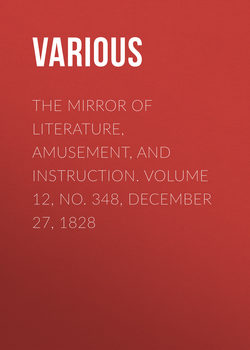The Mirror of Literature, Amusement, and Instruction. Volume 12, No. 348, December 27, 1828

Реклама. ООО «ЛитРес», ИНН: 7719571260.
Оглавление
Various. The Mirror of Literature, Amusement, and Instruction. Volume 12, No. 348, December 27, 1828
Barber's Barn, Hackney
CURIOUS STONE PULPIT
LAST DAYS OF, AND ROUGH NOTES ON, 1828
ODE TO MORPHEUS
ON IDLENESS
BLACKHEATH, KENT
THE NOVELIST
THE WOES OF WEALTH
SPIRIT of DISCOVERY
SPECIFIC GRAVITIES
STANGING
NOTES OF A READER
CHRISTMAS SCRAPS
A FRIEND
ENGLISH LANDSCAPE PAINTING
PANORAMA OF THE RHINE
EDINBURGH IN SUMMER
NAVARINO
CARVING AND GILDING
MAN
RETROSPECTIVE GLEANINGS,
GLEANINGS ON GLUTTONY
OLD POETS
CARELESS CONTENT
The Gatherer
FRENCH TRAGEDY
OLD AND NEW CHRISTMAS
THE IRISH SCHOOLBOY
A "RALE" SHOEMAKER'S BILL
PATHETIC REJOINDER
WHO TOLD YOU?
Отрывок из книги
The engraving represents a place of historical interest—an ancient mansion in Mare-street, Hackney, built about the year 1591, upon a spot of ground called Barbour Berns, by which name, or rather Barber's Barn, the house has been described in old writings.
In this house resided the noted Colonel John Okey, one of the regicides "charged with compassing and imagining the death of the late King Charles I." in October, 1660. Nineteen of these "bold traitors," (among whom was Okey,) fled from justice, and were attainted, and Barber's Barn was in his tenure at the time of his attainder. His interest in the premises being forfeited to the crown, was granted to the Duke of York, who, by his indenture, dated 1663, gave up his right therein to Okey's widow. The colonel was apprehended in Holland, with Sir John Berkestead and Miles Corbett, in 1662, whence they were sent over to England; and having been outlawed for high treason, a rule was made by the Court of King's Bench for their execution at Tyburn. These were the last of the regicides that were punished capitally.
.....
"Enough of this:" 1828 has nearly got the "go-by" and we have outlived its pains and perils, its varied scenes of good or evil, and its pleasures too, for there is a bright side to human reverse and suffering, and we are ready at our posts to enact and stand another campaign in this "strange eventful history." We often find that the public discover virtues and good qualities in a man after his death, which they had previously given him no credit for; let this be as it may, 1828 may be deemed a very "passable" year. To use a simile, a sick man when recovering from a fever, makes slow progress at first; and we should fairly hope that the gallant ship is at last weathering the hurricane of the "commercial crisis," and that the trade-winds of prosperity will again visit us and extend their balmy influence over our shores; and to borrow a commercial phrase, we trust to be able to quote an improvement on this head next year.
The march of mind is progressing, and the once boasted "wisdom of our ancestors" and the "golden days of good Queen Bess," are hurled with derision to the tomb of all the Capulets. We regret that we cannot chronicle a "Narrative of a first attempt to reach the cities of Bath and Bristol, in the year 1828, in an extra patent steam-coach, by Messrs. Burstall, or Gurney." The newspapers, however, still continue to inform us that such vehicles are about to start, so we may reasonably expect that Time will accomplish the long talked of event. Nay, we even hear it rumoured that the public are shortly to crest the billows in a steamer at the rate of fifty or a hundred miles an hour! and this is mentioned as a mere first essay, an immature sample of what the improved steam-paddles are to effect—also in Time; who after this can doubt the approaching perfectibility of Mars? Oh, steam! steam! but this is well ploughed ground.
.....